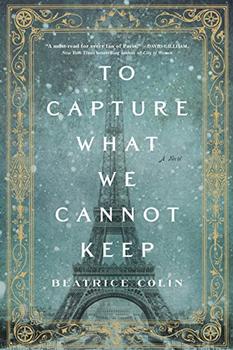Summary | Excerpt | Reading Guide | Discuss | Reviews | Beyond the Book | Readalikes | Genres & Themes | Author Bio

"Will you wait here?"
"Are you going to go without me?" Alice asked.
At that point, the idea hadn't even occurred to Cait. Of course she should stay behind; she was a companion, paid to accompany and supervise Alice and her brother, Jamie Arrol. Also, at thirty-one, she was far too old to be spontaneous. Worst of all, heights, steep ascents, and theater seats in the upper circle all terrified her. And yet, as she had told herself in the carriage on the drive to the showground, she would get the chance only once in her lifetime and so she must take advantage.
"Maybe I should," she said. "Would you mind?"
"No, don't remain on my account."
"And you'd be safe? You wouldn't move an inch from this spot."
"I won't be seduced, I promise. Just go, Mrs. Wallace."
"The tickets are already paid for," Cait called as she climbed toward the outstretched hand of the balloon handler. "It would be a terrible waste if we didn't use them. Your uncle would be outraged! Mortified! Can you imagine?"
She looked back just as Alice laughed out loud, then quickly covered her mouth with her hand. Ironically, for a girl who spent so long perfecting her expressions in the mirror, she was prettiest like that, when she forgot herself.
When the last few sandbags had been tossed over the side and the ropes coiled, the pilot leaned on a lever, air rushed into the brazier, the fire roared, and the balloon began to rise with the upward momentum of an air bubble through water. Cait shut her eyes and held tight to the wicker edge of the basket as the balloon ascended. Despite everything, it was just glorious.
Eight years earlier Cait had had no idea that she would end up here, rising into the sky above Paris, practically weightless, impossibly high. She had been married, settled, grounded. Her husband, Saul Wallace, was handsome and debonair, their home in Glasgow was large and comfortable; their shared future stretched out in front of them like the red roll of a carpet. There would be children, holidays, anniversaries.
Saul was just thirty-two when his train left one side of the River Tay and failed to reach the other. It was three days after Christmas, December 1879. As Cait sat beside the fire and opened a novel, she had not known—how could she—that at that moment their life together was ending, that the Tay Bridge had collapsed and Saul Angus Wallace was drowning in black-water currents beneath several tons of hissing iron.
The hot-air balloon had reached the end of its chain and came to a sudden, jolting halt. She opened her eyes. The brazier roared, the balloon still floated in the air, the world was as she had left it; Paris below and the sky above. For a moment she focused on breathing. She wouldn't let herself think about the empty space beneath the gondola. She wouldn't imagine the altitude they had reached. The other passengers rushed from one side to the other, clearly unconcerned that they were suspended by nothing more than hot air. No one else was fearful, no one else stood, as she did, several feet from the basket's rim in the grip of a private terror.
"What a view!" Jamie Arrol was peering over the edge, almost hysterical with happiness. "Come and look."
"I will," she said. "In a minute."
He turned and noticed that she was alone.
"Miss Arrol changed her mind," Cait explained.
"She missed out." He shrugged. "There's the Panthéon … the Arc de Triomphe … and over there … I think that must be Notre-Dame! Look!"
Cait steeled her resolve, then cautiously, tentatively, hesitantly peered over the edge. And there, far below, were Baron Haussmann's wide boulevards that followed the line of the old walls of the city, the green blot of the Bois de Boulogne, the pump of black smoke from the factories in the south, the star spokes radiating from the Place de l'Étoile, and, closer, the Place du Trocadéro. And there were lines of carriages as tiny as black beetles, people as minute as ants, the city as small and regular as a set of children's stone building blocks placed on a painted sheet.
Excerpted from To Capture What We Cannot Keep by Beatrice Colin. Copyright © 2016 by Beatrice Colin. Excerpted by permission of Flatiron Books. All rights reserved. No part of this excerpt may be reproduced or reprinted without permission in writing from the publisher.
Your guide toexceptional books
BookBrowse seeks out and recommends the best in contemporary fiction and nonfiction—books that not only engage and entertain but also deepen our understanding of ourselves and the world around us.